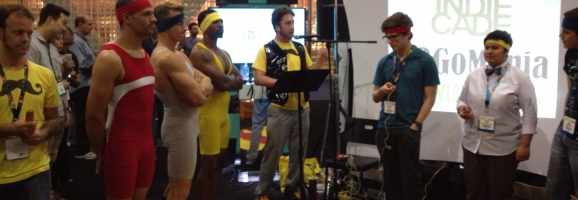Three Things We Took Away from E3 2013
If I had to choose a word to describe the dramatics of this year’s E3, it would be “bonkers”. Shots were fired, fans and professionals reacted vehemently, and controversies over gender inclusivity, maturity, and game ownership remained unanswered. Considering this marks the start of a new console cycle, the events of this year’s conference will be significant in the future. In no particular order, here are three things that I think we took away from this conference that will be important to the future of commercial games.
1. (Console) War, war never changes… except when it does.
Even if we look beyond the “console wars” narrative that has plagued dialogue about games since the early 90s, the competition between major console manufacturers is a major determinant in the cultural patterns of each successive generation. Demographic branding and fan culture has always been a huge part of “gamer culture”, and companies focused on building consumer loyalty through adherence to a certain image, hoping that fans would take the work of marketing and hype for them. Maintaining loyalty was at the heart of the “console wars”… until now.

In the course of three weeks, Microsoft seems to have successfully alienated much of its fanbase, and longtime fans seemingly turned on them overnight. Snarky Xbox expatriates made blows at the console on Twitter under the hashtag “#xbone”, remarking that they plan to pick up the Playstation 4 instead. Microsoft’s failure to address the controversies over game ownership and DRM communicates an unfortunate sense of obliviousness towards frustrated consumers. “I’m abandoning Microsoft.” says Catherine Fox, “They’ve been a constant disappointment to me over the years. Time to return to the Playstation.”
To rub salt in the wound, Sony’s Monday press conference seemed to have been written in direct response to the backlash directed towards Microsoft’s console, listing off a series of bullet points about what the Playstation 4 doesn’t do, specifically, region-locking, DRM, and requiring a constant internet connection. With this move, Sony seems to be specifically targeting Xbox users burned by Microsoft’s recent faux pas. Nothing made this more clear than the Playstation 4’s pricing of $400, nearly $100 less than Microsoft’s console. “I never thought I would legitimately feel bad for Microsoft” says Chloe Lister.
Ultimately, the dramatics of this year’s E3 are spectacular and concerning given their ramifications in this industry. Even though Xbox One’s restrictive policies and schizophrenic focus spells negativity for consumers, nobody is asking for them to fail. Competition is important for console manufacturers, and the dystopian and far-fetched vision of a future dominated by a single company would mean an incredible regression for the medium. Nintendo’s focus on casual gamers and families indicates that they aren’t competing for the same “gamer” demographic as Sony and Microsoft, putting the more in line with systems like the Ouya or iOS, they drove home this point by opting out of holding a major press conference this year. That leaves only two corporations competing for the same demographic, and considering the backlash directed at one of them, I’d say that the next few years have some strange twists in store.
2. Indies matter.
I am aware that indie games have never been more important to the game industry, and have even become economically significant on Steam and the App Store. Richard Lemarchand called our time a “ludic Renaissance”, and I personally describe our period in history as “Ludus Florentis”, Anna Anthropy documents this phenomenon very well in her book Rise of the Videogame Zinesters. Point is, having an open platform where a diversity of niche games can be easily and cheaply published is going to be important to success this generation, considering that the two major Game of the Year nominees of 2012, The Walking Dead and Journey, were both downloadable indie games, ignoring that sector will be extremely detrimental. To that end, the three major console manufacturers have all made their efforts to succeed in that downloadable space. Sony and Nintendo both revealed democratized submission and production processes earlier this year at GDC, and games like The Witness, Minecraft, and Below all took prominent spots at the press conferences.

Problem is, coaxing a specific indie developer like Jonathan Blow, Notch, or Capybara to your platform doesn’t mean much at all in the long run. You don’t help indies through exclusivity deals with already established developers, you help indies by having accessible frameworks and distribution structures open enough to allow game jammers and college kids to publish their games to online shops. When it comes to indie games, possessing exclusivity rights to “the killer app” doesn’t matter as much as having a very diverse range of interesting and unique games.
Outside of the press conferences, the indie presence was considerably more substantial than in years past. The fantastic Indiecade festival had a booth on the show floor which unfortunately didn’t get quite the press coverage that it deserved, as of this writing, the sole video I could find was this one by Gamespot. “Indiecade objectively had the best booth”, said Esteban Fajardo, who was in charge of developer relations for the festival. Furthermore, Kellee Santiago and the OUYA team exhibited their new, Android-based console for downloadable games outside of E3’s show floor, reflecting the console’s mantra of openness by allowing people to see the console without dropping substantial amounts of money on tickets and passes. That is, until cops were called in on their show, prompting the tounge-in-cheek “#occupyE3” hashtag.
Perhaps most important was the Horizon conference‘s debut Thursday morning. Sponsored by the Museum of Contemporary Art and Venus Patrol, Horizon was a press conference reserved exclusively for indie developers. There, Kellee Santiago announced that Indiefund would be backing two new Double-Fine produced games, Capybara exhibited their Xbox One rougelike-like Below, and Phil Fish unveiled a teaser for a sequel to his dimension-bending platformer FEZ. Perhaps the most important and exciting news of the night was the announcement that Keita Takahashi, arguably the breakthrough proponent of experimental games, would be joining Robin Hunicke’s Funomena studio. If you believe in auteur theory, you imagine how amazing a duo of the Katamari and Journey producers could possibly be.
3. Something got lost in transition.
Sure, a lot of great things were unveiled this year. Some games like Transistor, The Division, and Mirror’s Edge 2 looked like a lot of fun, even Watch Dogs, when we finally got to see actual footage, seemed pretty innovative, and Nintendo skipped the conference entirely to exhibit a selection of impressive sequels to their classic franchises through Nintendo Direct. In fact, as one of the last major publishers of family games with strong local multiplayer, I think Nintendo did a stellar job exhibiting the next iterations of Super Smash Bros. and Mario Kart, and even rejuvenating some of their aging franchises like Pikmin. “I had to watch Nintendo’s in Japanese and it still thoroughly sold me on most of the games they showed” said Chloe Lister, indicating that this company still has what’s necessary to remain loved by its great fanbase.

But in spite of that excitement over upcoming games, the trend to show little gameplay footage at the press conferences is extremely concerning. Exhibiting prerendered or in-engine cutscenes tells no meaningful information about a game and its play. While the cinematic trailers for Watch Dogs and Assassin’s Creed 4 were indeed slick, the dearth of gameplay footage conveyed nothing important about the game’s interactive qualities. In fact, a reliance on the cinematic action of these trailers conveys an underlying cowardice, as if a company felt that as if the core gameplay was too weak to intrigue consumers. This concerning, if not dishonest, trend manifested in many game trailers unveiled at this year’s E3.
Outside of the publishers’ decisions to hold their press conferences outside of E3 at places like the Shrine Amphitheater and the misinformation perpetuated by uninformative trailers, the most frustrating thing about E3 was the disparity between it and GDC. While the two conferences face opposite sides of the game industry, it would seem that some promise was lost between the two conferences. 2013’s GDC spun a magical and giddy narrative about how game creation was about to become more democratized, inclusive, and fair, a narrative that I hoped to see manifest at the consumer-facing E3. Very little of that excitement transferred to E3. While we pushed for gender inclusivity with the #1reasontobe movement, E3 responded with a gratuitous and puerile rape joke. Something got lost in the transition. GDC 2013 was about getting everyone to make and love games and turning the conversation towards the most creative and experimental practitioners of the medium, the game industry reflected at this year’s E3 wasn’t quite the game industry that we saw earlier this year.
What did you take away from this year’s E3? What games are you excited for and which of this week’s stories do you think will be important in the future?
What do you think? Leave a comment.











Great article. I also found the lack of legit game play footage a little confusing. While I wished there was more substance, it’s becoming increasingly more commonplace to let editing do the talking, rather than taking the chance of seeing real time effects fall flat
I agree. The worst offense came from EA in the MS conference, I think, leading us all to believe that the Battlefield 4 showing was done real-time on an XBone when one can clearly see a prompt for the backspace key in the top right corner.
Why even try? When things are getting shown all over the world at the same time, chances are someone, somewhere is going to notice where you are blatantly lying to the audience.
yeah, and we saw that problem present in a lot of games from Assassins’ Creed to Forza. They’re all great games I’m sure, we just want to see how they play, since pre-edited video doesn’t tell us much about fun.
At E3, most demos are played on PCs with the same exact graphics cards and ram capabilities as the console. It is cheaper to show it on computers than on the Xbox One.
That presenter for Microsoft. Couldn’t they have got someone better, that has the skills to PRESENT to an audience. Was I the only one concerned about it? Anyway, they failed on so many levels. And Sony played their cards right, they sure did.
Hasn’t there been a lot of controversies revolving the pricing? When my friend and I learned the Specs of the PS4 we tried to make the cheapest PC comparison that we could… and it came out to about $900, more than double the price of the PS4.
Honestly, consoles never pull in money for the big 3, even Nintendo (except for maybe the Wii), with each system sold these companies actually still lose more money than they gain but make up for it with the titles they release for the systems. You only have to make a game once then pay for the price of however many discs you want it on.
So whether you buy a XBO or a PS4, you are getting a great value.
while the ps4 did dominate the xbox one, i am getting the xbox one first and i already have it preordered (i plan on getting the ps4 next year). three games sold me on that. halo 5 because no series has a universe as big as halo, titanfall because it was made by people that made cod when cod was actually good a long time ago, and sunset overdrive because you cant go wrong with the creators of spyro.
I was hopeful that Microsoft would adapt to the initial criticisms of the Xbone, but instead they have committed to digging deeper and deeper holes for themselves. It has been a fantastic display of corporate stubbornness, the likes of which you would not expect from the company that produced such a triumphant platform as the 360.
Microsoft has truly emphasised its interest in money with its outrageously restrictive policies; if choosing PS4 over Xbone is the only meaningful protest I can make, you can be sure that I’ll make it.
I’ve just gone way beyond disappointment to being staunchly against Microsoft’s console – at least in its current form. There isn’t an exclusive or control pad in the world that could make up for what they’re attempting to do with this generation, as far as I’m concerned.
Of course, like Microsoft, I may end up doing some back-tracking on this, heh.
Here come the corny Xbox 180 jokes!
When you have a CEO that addresses concern of a lack of affordability of the X-Box 1, the only console in Microsoft with internet capabilities, he said just play with the X-Box 360 and live with no internet capabilities. This shouldn’t be surprising.